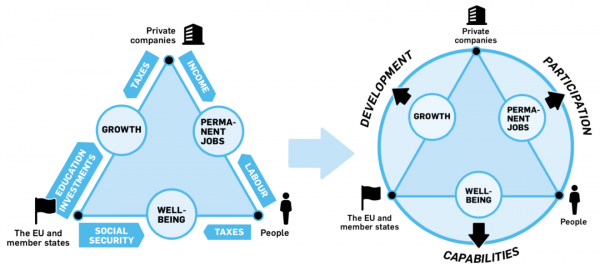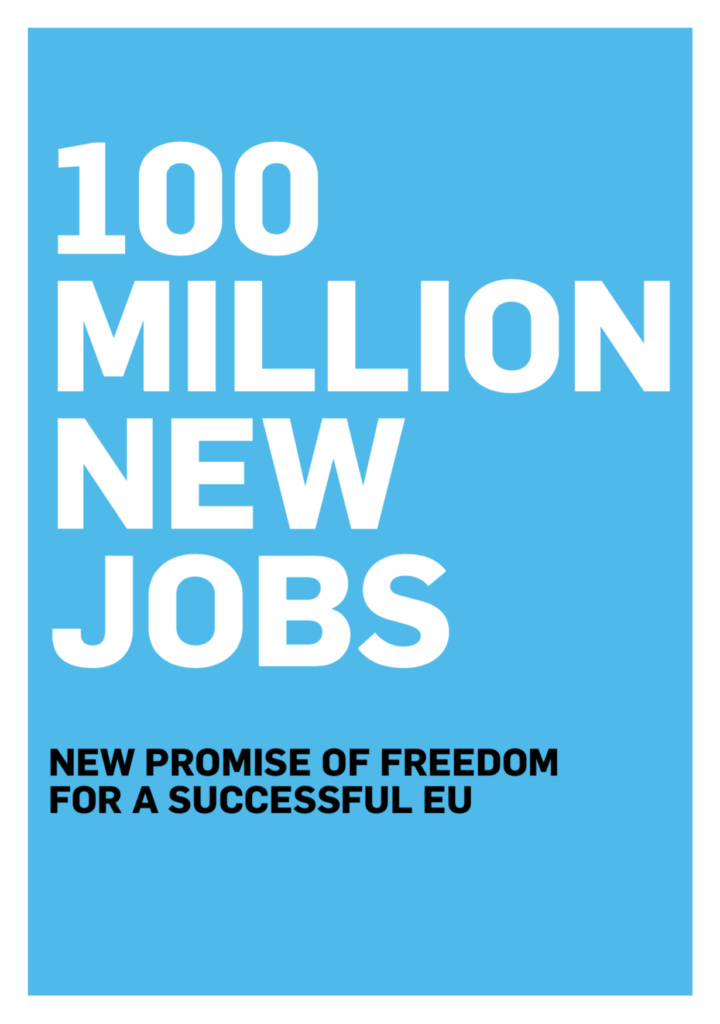We have managed to fulfil the basic needs of almost all Europeans, yet we have not abolished the sense of deprivation that people feel. This publication provides three transitions to set out a new direction for a successful EU.
We have managed to fulfil the basic needs of almost all Europeans, yet we have not abolished the sense of deprivation that people feel. This publication provides three transitions to set out a new direction for a successful EU.
Europe has invested wisely in the most valuable resource of this era: its people. It’s the greatest wealth the EU has. However, current social structures are not designed to address the challenges posed by digitalisation, climate change, scarce natural resources and globalisation.
How can we turn the EU’s investment to people into 100 million new jobs? How can we shift from measuring growth to measuring economic development?
This publication is directed at and written for policy-makers in the European Union and its member states. It provides support for a long-term vision, which includes augmenting the global role of the EU and empowerment of its citizens in the transformation towards a low-carbon economy, as presented in the European Commission Work Programme 2019.

Three transitions create the new promise of freedom for a successful EU
1. FROM SECURING WELFARE TO PROVIDING CAPABILITIES. Welfare as simply fulfilling basic needs and necessities can no longer be seen as enough for enhancing well-being. We must allow people to act freely in society and offer them capabilities that enable self-actualisation. The EU can achieve this through platform governance and reforms related to education.
2. FROM PERMANENT JOBS TO PARTICIPATION. Currently, many people belong to society through one job. This continuity seems to be more and more difficult to maintain. The EU needs to guarantee a sense of security and the availability of new jobs by creating more functional markets.
3. FROM MEASURING GROWTH TO MEASURING ECONOMIC DEVELOPMENT. Economic growth is an outdated proxy for measuring prosperity. We need to create new measures of development that recognise intangible value creation and quality of life for individuals.
We have designed these ideas to aid longer-term planning and open up new perspectives on desirable futures for European societies. We hope that our publication supports people who are designing industrial, energy, digital, and labour policy in the coming years.
We need you to join us in reimagining European societies.



White paper: Green skills for green futures
Publication
December 4, 2023
Report: Knowledge and training needs for a green transition
Publication
September 16, 2024
A Shared Objective for the Future of Work
Project
November 14, 2017
MERGE: Building economic policies beyond GDP
Project
April 15, 2024
Impact of algorithmic management on workers
Project
September 23, 2024
Incurable Assets – Why our ability and willingness to change cannot be held hostage to unsustainable financial valuations
Post
March 21, 2019
Reorienting the aim of the economy to increase the transformative capabilities of the EU
Post
January 28, 2020
Sustainable growth replaced the welfare state
Post
January 12, 2016
Steering through capability
Publication
December 11, 2020
Accessibility, inclusion, and participation
Publication
May 6, 2021
A Vision for Higher Education in 2030
Project
October 11, 2017
Cassandra initiative
Page
May 7, 2025
Building a new economy
Theme
December 1, 2025